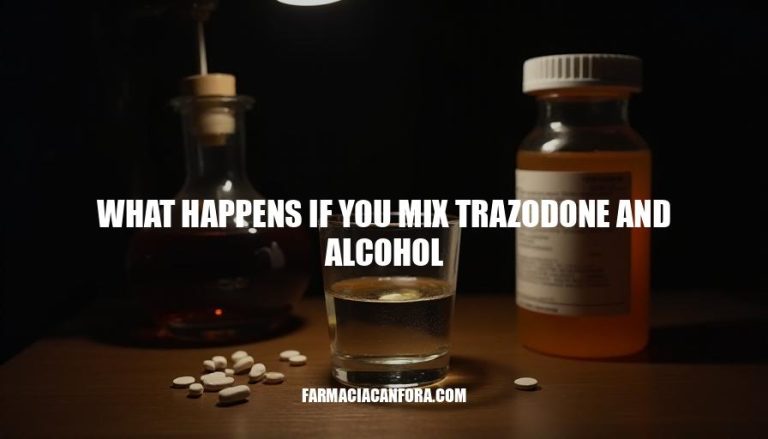


Mixing trazodone with alcohol can be very bad for your health. Both are depressants that slow down your nervous system. When you mix them, the effects get stronger – like feeling dizzy or drowsy.
It can also make it harder to move around safely. In worse cases, it can lead to breathing problems, overdose, and even liver damage. Knowing these risks is key to staying safe.
Mixing trazodone and alcohol can lead to significant interactions, health risks, and side effects, particularly affecting the central nervous system (CNS). Both trazodone and alcohol are CNS depressants, meaning they slow down brain activity and bodily functions. When combined, their effects can amplify, leading to severe consequences.
Central Nervous System Effects: Trazodone works by increasing serotonin activity in the brain, which helps alleviate depression and insomnia.
Alcohol, on the other hand, disrupts normal brain function and impairs coordination, judgment, and reaction times. Together, they can cause extreme sedation, delayed reaction times, compromised motor skills, and loss of consciousness.
Increased Drowsiness and Dizziness: Both substances independently cause drowsiness and dizziness. When mixed, these effects are heightened, increasing the risk of falls, injuries, and accidents.
This is particularly dangerous for older adults, who may already be at higher risk for falls.
Respiratory Depression: Combining trazodone and alcohol can slow breathing to dangerous levels, potentially leading to respiratory depression or even overdose. This risk is further heightened if other CNS depressants, such as opioids, are also involved.
Liver Damage: Trazodone can occasionally cause liver problems, and chronic alcohol use is known to lead to conditions like fatty liver and cirrhosis. Mixing the two substances can exacerbate liver damage over time.
Mental Health Risks: Alcohol can worsen depression and anxiety, counteracting the therapeutic effects of trazodone.
This combination may lead to drastic mood swings, increased suicidal thoughts, and impaired decision-making.
Overdose Symptoms: The risk of overdose is significantly higher when trazodone and alcohol are combined. Symptoms may include seizures, vomiting, irregular heart rhythm, and slowed or stopped breathing. Immediate medical attention is crucial in such cases.
Long-Term Risks: Prolonged use of both substances can lead to physical dependence and withdrawal symptoms.
Withdrawal from trazodone may include dizziness, nausea, and irritability, while alcohol withdrawal can be life-threatening.
Given these risks, it is strongly advised to avoid mixing trazodone and alcohol. If you are taking trazodone, consult your healthcare provider about safe practices and alternatives to alcohol consumption.
1www.goodrx.com2americanaddictioncenters.org3alcoholrehabhelp.org
Mixing trazodone with alcohol can have severe consequences, including increased drowsiness and dizziness, respiratory depression, liver damage, mental health risks, overdose symptoms, and long-term dependence. Both substances are CNS depressants that slow down brain activity and bodily functions, amplifying their effects when combined. This can lead to extreme sedation, delayed reaction times, compromised motor skills, loss of consciousness, falls, injuries, accidents, and even life-threatening situations.
The combination of trazodone and alcohol can exacerbate existing health conditions, worsen depression and anxiety, and impair decision-making. It is crucial to consult a healthcare professional before consuming alcohol while taking trazodone to ensure safety and avoid potential risks. They can provide guidance on safe practices and alternatives to alcohol consumption.
The risks associated with mixing trazodone and alcohol are significant, and it is strongly advised to avoid this combination altogether. If you are taking trazodone, consult your healthcare provider about the potential dangers of combining it with alcohol and take necessary precautions to protect your health.